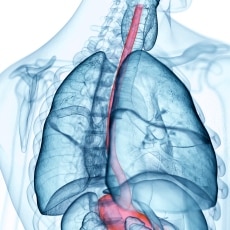
Cardiospasm

Summary
The esophagus is the muscular tube that carries food and liquids from your mouth to the stomach. You may not be aware of your esophagus until you swallow something too large, too hot, or too cold. You may also notice it when something is wrong. You may feel pain or have trouble swallowing.
The most common problem with the esophagus is GERD (gastroesophageal reflux disease). With GERD, a muscle at the end of your esophagus does not close properly. This allows stomach contents to leak back, or reflux, into the esophagus and irritate it. Over time, GERD can cause damage to the esophagus.
Other problems include heartburn, cancer, and eosinophilic esophagitis. Doctors may use various tests to make a diagnosis. These include imaging tests, an upper endoscopy, and a biopsy.
Treatment depends on the problem. Some problems get better with over-the-counter medicines or changes in diet. Others may need prescription medicines or surgery.
NIH: National Institute of Diabetes and Digestive and Kidney Diseases
Source: MedlinePlus, National Library of Medicine.
Information pulled from the Esophagus Disorders page.
MedlinePlus brings together authoritative health information from the National Library of Medicine (NLM), the National Institutes of Health (NIH), and other government agencies and health-related organizations.
Overview of the Esophagus
Merck & Co., Inc.
Barium Swallow
National Library of Medicine
Esophageal pH Test
National Library of Medicine
Understanding Esophageal Dilation
American Society for Gastrointestinal Endoscopy
Understanding Esophageal Manometry
American Society for Gastrointestinal Endoscopy
Upper GI Endoscopy
National Institute of Diabetes and Digestive and Kidney Diseases
Upper GI Series
National Institute of Diabetes and Digestive and Kidney Diseases
X-Ray Exam: Neck
Nemours Foundation
Achalasia - series
Medical Encyclopedia
Listen to our
latest Podcast!


